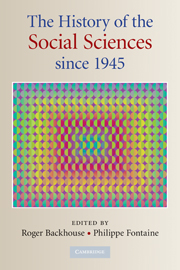6 - Social Anthropology
Published online by Cambridge University Press: 05 June 2012
Summary
Origins, Context, Institutions
A history of twentieth century anthropology is impossible. The configuration of the discipline is completely different in the United States and in Britain and France, its main European centres. In North America, anthropology remained, at least until the 1950s, an uneasy coalition of ethnology, archaeology, linguistics, and biological anthropology. ‘Cultural anthropology’ emerged as a virtually independent discipline in the 1930s, but its overlap with European ‘social anthropology’ was never complete. While social anthropology in Britain and France – and increasingly in other European centres – identified itself as a social science, ‘cultural anthropology’ found itself more at home in the humanities. I shall confine myself here to social anthropology, which is essentially a European social science, although with a significant presence in Brazil, India, Japan, Australia, and South Africa, and I shall concentrate on the development of the field in Britain, its major centre, while indicating some parallel developments in France and, more recently, in other European countries. My focus will be less on the internal intellectual history of the discipline than on its institutional contexts, which I believe were decisive for the trajectory taken by the field.
The colonial setting is crucial, though too often represented in polemical terms (as though social anthropologists in the first half of the twentieth century were either collaborators or true scientists).
- Type
- Chapter
- Information
- The History of the Social Sciences since 1945 , pp. 136 - 154Publisher: Cambridge University PressPrint publication year: 2010
References
- 2
- Cited by



